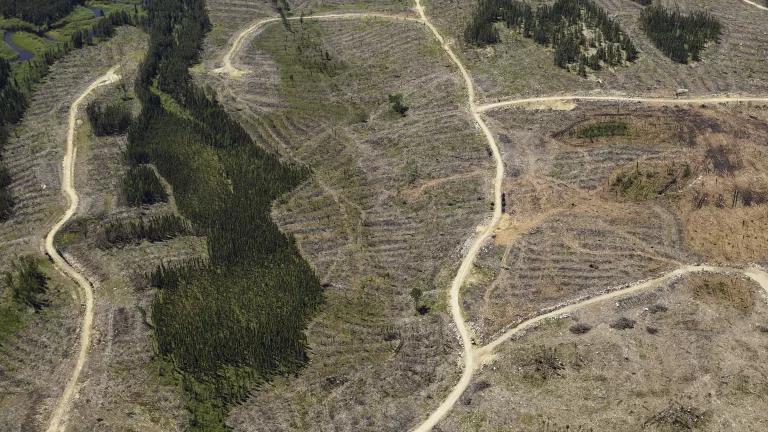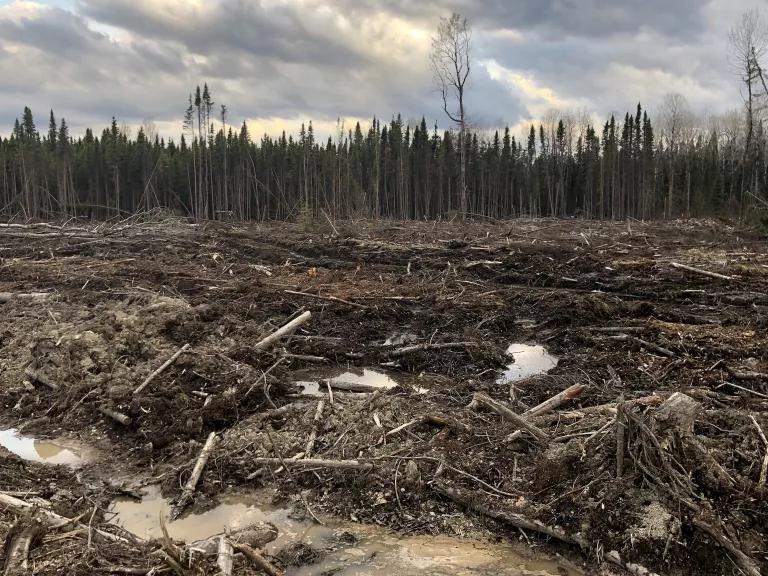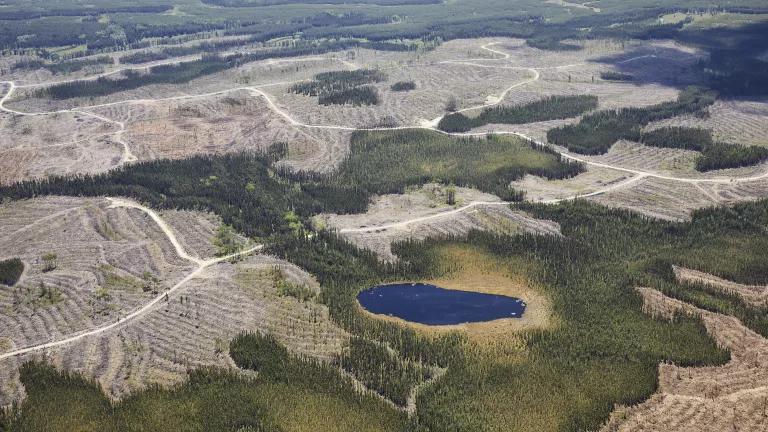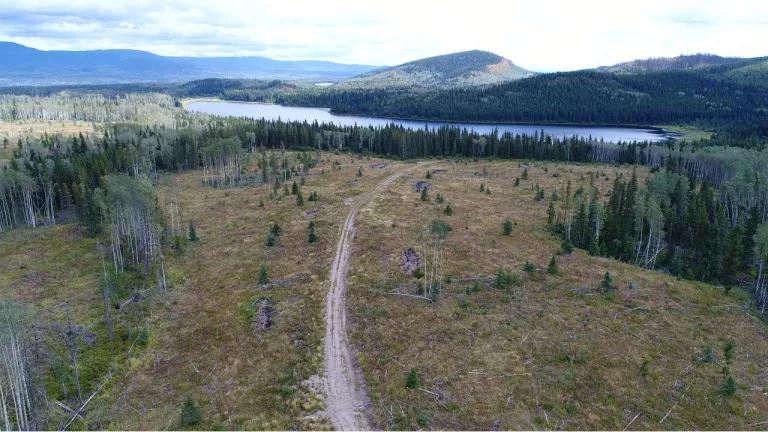Glasgow Forests Declaration Success Hinges on Northern Accountability
In the absence of accountability from the Global North, there are warning signs the Glasgow Leaders' Declaration on Forests and Land Use is set up for failure.

Clearcut logging in Ontario
River Jordan for NRDC
When 141 countries signed the Glasgow Leaders’ Declaration on Forests and Land Use in 2021, they enshrined, for the first time, a truly global vision of forest protection capable of meeting the urgency of the climate and biodiversity crises, and empowering local communities and Indigenous peoples. However, in failing to establish mechanisms to foster global accountability, they also set it up for failure. A study released this month illustrated the precariousness of the Declaration’s future, exposing that not only did global forest impacts fail to decline last year–they became worse.
The central weakness of the Glasgow Declaration is that, while the language itself is ambitious, it is superimposed on a longstanding international regime defined by a fiction that forest impacts are confined to the Global South. The Glasgow Declaration breaks with decades of failed policy precedent that focused exclusively on tropical deforestation, integrating long-overdue language addressing the Global North’s role in driving forest degradation. To successfully overcome and reshape the definitional loopholes, imperialist legacies, and insidious fictions that have burdened the last thirty years of forest policy, however, the Glasgow Declaration needs a strong mechanism for holding its signatories–particularly those from the Global North–accountable.
Over the last thirty years, the Global North has crafted a policy regime that’s perfectly contoured to exclude the logging industry, capturing the drivers of tropical deforestation while overlooking logging’s own devastating toll. “Deforestation” includes only the actual conversion of a forest to an entirely different land use, such as farming. Because a “forest” is essentially defined solely in terms of a landscape’s present or future timber supply, even a barren logging clearcut still qualifies as a forest, no matter how ecologically irreplaceable the forest that was lost, as long as it is not converted to a different type of land. International climate policy has similarly molded around logging, with emissions accounting methods that write off the industry’s impact and entire sectors like the demand in the UK and EU for biomass built around the fiction of logging’s innocuousness.
Behind every deforestation-centered agreement and emissions inventory, therefore, has been an imperialism-laced myth that forest impacts are confined to the tropics, a scourge uniquely driven by palm oil, cattle, and rubber, and undergirded by weak legal systems. The Global North, in contrast, doesn’t deforest; it practices “sustainable forest management.” Its products, including biomass, paper, and lumber, are not environmental pariahs—they are climate solutions.

Clearcut in Quebec
Industrial logging in the Global North has flourished within this narrative, discreetly earning the distinction as the single-largest driver of gross tree cover loss in the world. Canada, the epicenter of the myth of “sustainable forest management,” logs more than 1.3 million acres annually and has the third-highest intact forest landscape loss in the world, behind only Russia and Brazil. Sweden has lost more than 70% of its lichen-rich forests, while the United States still has open season on much of its remaining old-growth and mature forests on federal land. Across the developed world, entire forests are falling, with no one hearing a sound.
The Glasgow Declaration took a groundbreaking step toward ending the Global North’s free ride. In addition to requiring an end to deforestation by 2030, it commits signatories to halting land degradation, a term that applies more broadly to the loss of an ecosystem’s value, and therefore to unsustainable industrial logging.
Degradation captures industrial logging’s erosion of primary and mature forests and the resulting climate and biodiversity impacts, which rival those of tropical deforestation. Globally, logging accounts for approximately ten percent of all emissions. Logging is also driving precipitous species declines. In the North American boreal, for example, only 15 of Canada’s 51 boreal caribou herds, whose populations serve as a barometer for the overall forest health, have sufficient habitat left to survive long-term, while boreal bird populations in North America have plummeted by more than 30% in the last 50 years.
Paradigm shifts, however, require more than the mere stroke of a pen. The Global North’s commitments have almost entirely focused on directing funds to address tropical deforestation or trade measures focused on curbing the imports of illegally deforested goods. While important, these measures, on their own, create an illusion of northern responsibility that obscures the impacts of business-as-usual logging practices.
In fact, Canada has actively opposed numerous policies, both in the United States and the EU, that contain similar degradation provisions as those it signed onto in the Glasgow Declaration. The Government of Canada lobbied aggressively against a procurement bill in New York that would have implemented protections against boreal and tropical deforestation and primary forest degradation. Following the successful playbook it employed in California in 2021, Canada pressured the legislators to remove the boreal from the language of the bill. The bill just passed the New York legislature, now named the Tropical Deforestation-Free Procurement Act.
In contravention of its Glasgow commitment, Canada also attempted to remove a degradation provision from a new EU regulation, arguing that there is no commonly recognized definition of the term. In response to the EU’s refusal to remove the degradation language and enshrinement of a definition that clearly encompasses logging in the Global North, Canada is now engaged in definitional warfare, working to enshrine a far weaker application of the term.
Without leadership from the Global North, the Glasgow Declaration is failing everywhere. Of course, forest impacts have continued apace in the Global North, unfettered from any accountability mechanisms. But the situation is equally dire in the tropics, where the loss of primary forest accelerated in 2022, exceeding an area of more than 10 million acres. Non-fire impacts reached a 17-year high in Brazil. As in all recent years, logging accounted for the plurality of tree cover loss globally. While Global North countries may funnel money to address tropical deforestation, their lack of credibility weakens their push for change elsewhere. In addition, the lack of universal, equitable standards for forest sourcing hinder the marketplace transformations necessary to address tropical impacts, alongside northern logging.
Against this inimical backdrop, the Glasgow Declaration needs a strong accountability framework—one that places equal scrutiny and responsibility on the Global North to abide by its standards. With this year’s UNFCCC conference (COP28) centered on accountability, a Glasgow Declaration Accountability Framework would help ensure forests—and industry-driven forest emissions—take an appropriately prominent place in COP28’s deliverables.
This Glasgow Declaration Accountability Framework should contain several key provisions, including requiring annual reporting from all signatories on their domestic deforestation and forest degradation; affirming the Declaration’s application across tropical, temperate, and boreal forests; establishing scientist and policymaker oversight mechanisms to ensure compatibility between countries’ standards and reporting; enshrining common commitments to invest domestically in Indigenous-led protection; and other mechanisms to create clear, shared pathways to reaching the 2030 target.
Leading up to COP28, there is an opportunity for countries, both in the Global North and the Global South, to establish leadership on global forest protection through championing this framework. The United States, as one of the chairs of the Forest Climate Leaders’ Partnership, created last year to facilitate the Glasgow Declaration’s goals, is in a prime position to play this role, alongside Ghana, its co-chair. Particularly given President Biden’s recent focus on old-growth and mature forests on U.S. lands and his prioritization of global forest protection as a key climate priority, the United States has the opportunity to work with other leaders such as the EU to write a successful future for the Glasgow Declaration.
There are already strong policy and marketplace footholds around the world to help facilitate and support this accountability framework. In addition to the EU regulation, U.S. states like Colorado have begun enshrining standards that recognize and address forest degradation. Shareholders, recognizing the growing risks of corporate ties to forest degradation, are calling on companies like Procter & Gamble and The Home Depot to eliminate it from their supply chains. Leading investors such as State Street now include degradation language in their policies.
The Glasgow Declaration’s success over the next six years will require finally overcoming the mistakes and misinformation of the last thirty years. For decades, the global community has repeatedly attempted to generate real outcomes from a policy framework built on a collective, willful delusion. Shaping a new, sustainable reality for our forests, climate, and biodiversity, requires abandoning the fictions of the past and fostering a new era of accountability.




